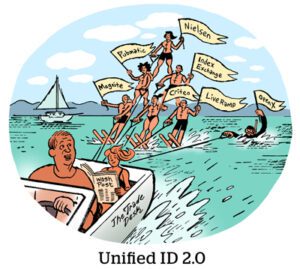Google has finally bitten the bullet and decided not to kill off third-party cookies in Chrome. No doubt it will go down as a pivotal moment in the history of digital advertising.
But it isn’t a decisive one.
With so many variables at play, including data regulation, user privacy concerns and technological advancements, Google’s update to the future state of third-party cookies and the Privacy Sandbox doesn’t offer much short- or long-term direction for marketers.
There’s plenty about Google’s plans for Chrome that remains unclear, such as what its new user experience will look like and what its reversal means for the 1% of Chrome traffic that’s currently cookieless. We also still have plenty of unanswered questions about what will happen on Android when it comes to mobile ad IDs and the mobile version of the Privacy Sandbox.
But if we take a step back, third-party cookies have become less important as a mechanism for digital advertising infrastructure, activation and measurement over time. And some recent moves by major ad tech players prove that the industry doesn’t actually need cookies.
We’ve moved on from third-party cookies
Our minds were changed about third-party cookies a long time ago, when browsers like Safari, Firefox and Brave blocked them by default. Apple is an important third-party cookie-free zone, and these other browsers, despite having lower market share than Chrome, are still viable for advertising.
Secondly, web-based advertising – the domain of third-party cookies – is slowly diminishing anyway, due to user behavior shifting to apps and social media and, soon, generative AI experiences. We’ve also seen the rise of emerging media channels that have no third-party cookies to start with, such as CTV, retail media and DOOH.
Meanwhile, Android, which has been particularly quiet during this update, is on a similar trajectory to Chrome with its own Privacy Sandbox solution and aims to eliminate the Android Advertising ID (AAID). And Chrome also has teased plans to phase out IP addresses. So the focus on cookies almost seems quaint.
To get a sense of how little third-party cookies really matter in today’s digital ad ecosystem, look no further than The Trade Desk. Despite developing an alternative to cookies in UID 2.0, The Trade Desk has never been worried about solving third-party cookie deprecation. Rather, the company seems to think its interests are best served by focusing on channels like CTV, where it is slowly cornering a dominant market share. Jeff Green’s recent response to Google’s pivot pretty much doubles down on this.
Omnichannel marketing means cookies matter less
Chrome is just one cog in an increasingly complex ecosystem that is full of legacy identifiers like third-party cookies and mobile ad IDs, alongside newer emerging approaches to contextual, cohort-based solutions and alternative IDs.
The advertising world has moved on, with a number of alternatives already identified across different areas such as measurement, activation and infrastructure. Some of these are super effective in their specialist area, some have become table stakes and some are still nascent and unproven. Others, especially new approaches formed around AI, will develop.
There isn’t a single future replacement; there are many.
The regulator’s gimlet eye
When it comes to cookie replacements, the industry will still be watching how things unfold with Google’s proposed cookie alternative, the Chrome Privacy Sandbox.
But Google’s decision shows that regulators’ influence over the future shape of the market is undeniable and unrelenting.
Over the past 24 months, the UK’s Competition and Markets Authority (CMA) has been keeping a watchful eye over Privacy Sandbox development. Google certainly deserves credit for making this process open to criticism and updates. But there are still some big challenges ahead in preventing Google’s ad solutions – for example, GAM as an SSP – from benefiting from the Sandbox.
Google’s ad teams (both buy and supply side) have released results from Privacy Sandbox testing that prove it will not be a perfect replacement for current advertising methods. The industry must now accept this fact.
But let’s also keep in mind that third-party cookies have flaws that make our current activation and measurement capabilities unreliable and overexaggerated.
And let’s not forget: There are likely to be more macro implications from the fallout of Google’s antitrust case in September, as well as the ever-changing state of the EU ad tech landscape due to the Digital Markets Act. And the US is starting to tackle a federal approach to privacy through the American Privacy Rights Act, in addition to an increased focus on hashing PII.
What does the future hold?
Regardless of Chrome’s reversal, third-party cookies are declining as an active signal. This will be even more so the case once Chrome’s new user prompt rolls out.
The Privacy Sandbox will be a part of the conversation, although with less urgency attached. IP Protection is also moving closer to full adoption. But solutions that are more friendly to advertising use cases are still likely to exist in some mechanism, such as the Attribution Reporting API for ad measurement.
It’s the marketer’s imperative to invest time into understanding the state of the ecosystem. Get into the weeds on different technologies and methodologies. Only then can you choose what will work best to future-proof your campaign strategies.
“Data-Driven Thinking” is written by members of the media community and contains fresh ideas on the digital revolution in media.
Follow Kepler and AdExchanger on LinkedIn.



















